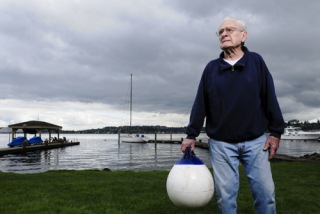More than a dozen North Mercer neighbors gathered at last week’s City Council meeting to express admiration for Islander Hu Riley.
Riley, who was lauded as one of “Mercer Island’s finest citizens” and “a true American hero” — the veteran fought on the beaches of Normandy, North Africa and Sicily during WWII, earned three Purple Hearts and returned to Mercer Island to raise a family — was also present at the meeting with his wife, Charlotte.
Riley was the reason for the gathering at City Hall, as a proposal to name the body of water between the Roanoke Inn and Luther Burbank Park “Riley Cove” was up for City Council endorsement. The city endorsed the proposal, six to one.
The idea to dedicate the body of water, which currently has no name, after Riley was proposed by Islander Rob MacAulay earlier this year.
“We learned that not only is Hu’s family one of the pioneering families of Mercer Island, having lived on the cove for nearly 100 years, but Hu himself has spent his entire life, all 88 years of it, living in the same home on the cove,” Rob MacAulay said in a recent letter to the editor.
But not all were in support of naming the body of water after Riley. Three North Mercer residents asked that the City Council postpone its endorsement and hold a public process on the matter. This would allow Island residents to propose, discuss and support alternative names for the cove.
“The city should engage in a more public process before naming the cove,” Island resident Anne Fox told the Council.
Margaret Philbrick, whose family has lived on the North-end cove for three generations, initiated the idea of holding a public naming process. Philbrick has proposed McGilvra Bay, named after one of the Island’s first ferry docks — now called Lincoln Landing — as an alternative name to Riley Cove.
“People used to come from Seattle by boat to McGilvra Dock. This whole section of the Island is called the McGilvra addition. It is definitely a word that is currently being used in the common lexicon, and the dock was an extremely important historic feature for this part of the neighborhood,” she said.
Philbrick, who said that she respects Riley and those who support naming the cove after him, believes that there should be more historical research and input on the matter.
“I think the public process is important because it provides more information and allows for development and refinement of the final conclusions. It helps make sure that people are making well-thought-out decisions that are representative of the community,” Philbrick said.
Ultimately, the decision comes down to the Washington State Board on Geographic Names. Submitted names go through a detailed process of consideration and vetting before the board formally approves the suggestion. They must meet a list of criteria, including that the name serves the public interest; is strongly supported by local residents; is assigned to a location that has no “single generally accepted name in use”; is significant to the early history of Washington state; is pertinent, in good taste and not duplicated within the state.
The seven-member board then meets to discuss the proposed name, working in cooperation with the local residents and the U.S. Board on Geographic Names before establishing it as official.
Because the board conducts such a thorough vetting system — of which Island residents play an important part — before approving the name Riley Cove, the City Council agreed that it was unnecessary to organize its own public process on the matter.
“Washington state already provides a public process. I don’t believe we need to provide a public process on top of theirs,” said Councilmember Steve Litzow.
In fact, MacAulay already surveyed the residents of the cove, writing a letter to 55 households about Riley and asking whether individuals would support honoring the Riley family in namesake. Thirty-five of the 38 people who responded cheered the idea.
According to Mayor Jim Pearman, public names and dedications have always created a stir on Mercer Island; especially given the presence of legacies, such as Riley, in the community.
“Naming things on the Island has always been a touchy issue,” Pearman said.
The mayor admitted that, going into the meeting, he was prepared to postpone endorsing the name Riley Cove until a public process was had. Yet after hearing residents speak in admiration of Riley — for his humble service to the community, his devotion as a family man, and his heroism on the battlefield — Pearman changed his vote.
“Tonight, I’ve been persuaded to violate my own principles of process, and I will support the motion,” he said.
Other Councilmembers were more personal in their support.
“I’m speaking for three of us [Councilmembers] as veterans. I may be the only one outside Riley with a purple heart, and that’s why I’m supporting him,” El Jahncke said.
Councilmember Cero considered the Island’s children in his vote.
“This is an opportunity for us to have a permanent tie to American history for our kids to study,” Cero said. “There will be a thread from Riley Cove on the North end to overseas, to World War II, to D-Day, and that’s no small task.”
The Washington State Board on Geographic Names will review the submission of “Riley Cove,” which includes the City Council’s endorsement, on May 15. If “Riley Cove” is chosen, the name will appear on all state maps.



